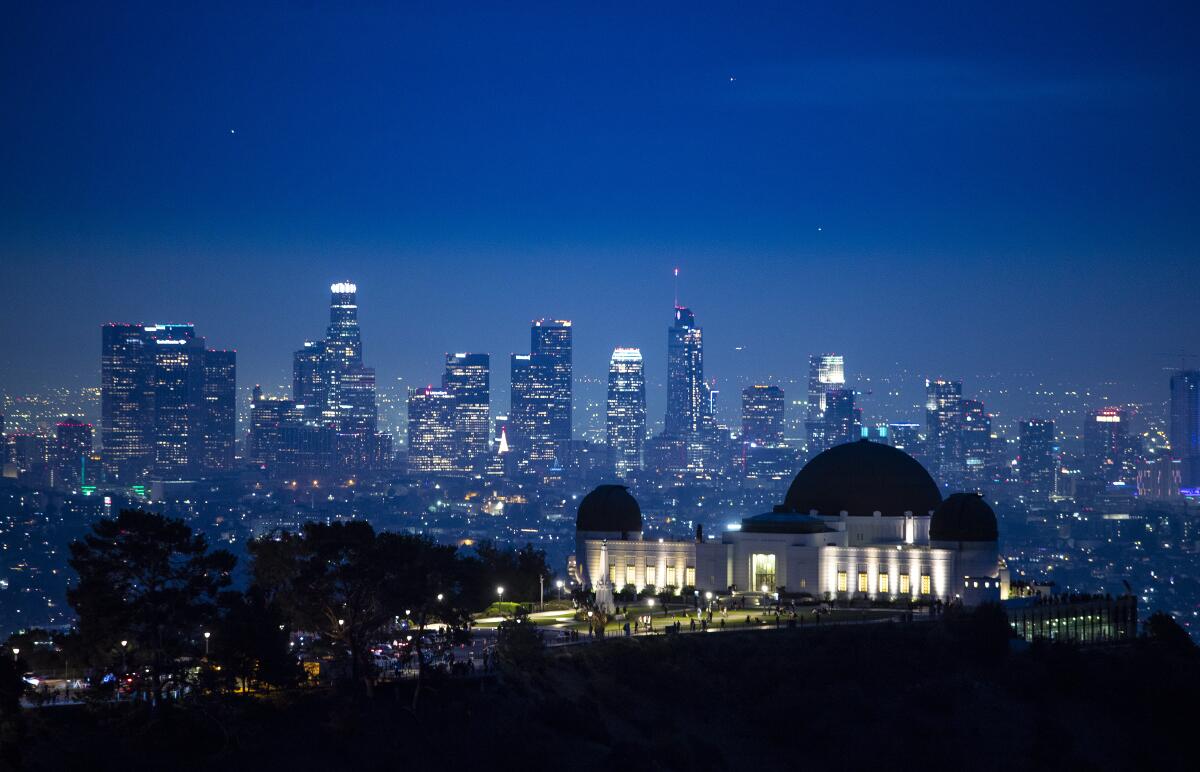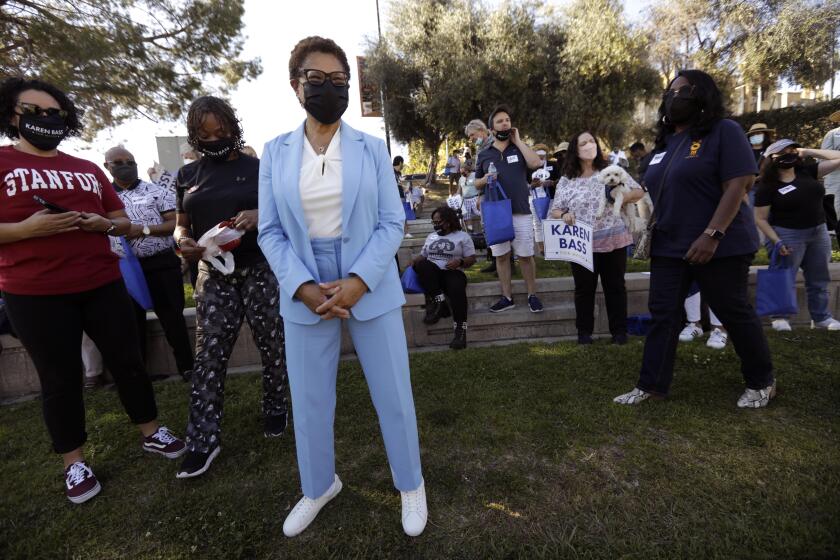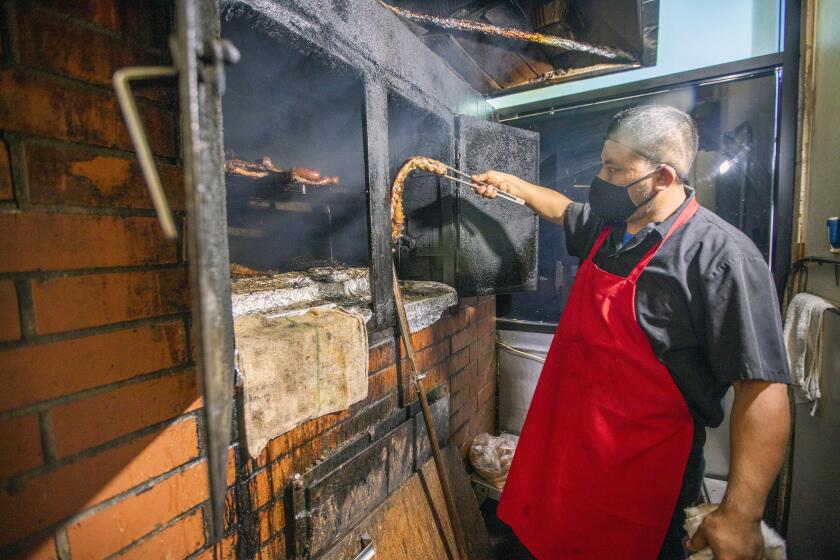Escape from L.A.? No, most people like it here, poll finds

Not long after Rams defensive tackle Aaron Donald threw Bengals quarterback Joe Burrow to the ground, guaranteeing victory in the Super Bowl, the PA system started blaring the cityâs go-to victory song.
Few compositions better express the allure of Los Angeles than Randy Newmanâs 1983 ode to the city, its music, sunshine and boulevards, and while âI Love L.A.â is nearly 40 years old, the message still plays well for Angelenos.
In a slightly more prosaic manner, they registered their affection for the city in a poll recently conducted by the Institute of Governmental Studies at UC Berkeley and co-sponsored by The Times.
A little more than 2,100 of them were asked to weigh in on California (crime, schools, Newsom), the country (Biden, Harris, Feinstein), the coronavirus (better or worse?) and schools (better or worse?), and among its 40 or so questions, No. 22 leaps out like a roller-skater on the Venice boardwalk.
Some people have a great attachment to Los Angeles, while others donât like it at all. Taking everything into account, how would you describe Los Angeles as a place to live?
Nearly three-quarters of respondents rated their city as either âone of the best places to liveâ or ânice but not an outstanding place to live,â and while it may be hard to put those responses to music, they hit the high notes for many who would live no place else.
âLos Angeles is this fabulous city of discovery,â said John Szabo, who moved to the city 10 years ago from Atlanta. âIt is a city that is constantly revealing itself to you. I feel like Iâm constantly learning something new about L.A. I think that is incredible.â
Voters would advance Rep. Karen Bass to the November runoff by a wide margin if the Los Angeles mayoral primary were today, according to a new poll co-sponsored by The Times.
If Szabo comes across as a booster for Los Angeles, perhaps itâs understandable. As the city librarian, he has a broad portfolio â 73 libraries to look out for â that has given him an opportunity to take in the cityâs energy and breadth.
âI know it may be presumptuous,â said Szabo, 53, âbut I feel I can spend a few days in Chicago and get a sense, a feel for what it is like, the people and neighborhoods. In L.A., you just canât do that. In L.A., you have to invest the time.â
Although the poll hardly represents a consensus â it was taken among registered voters, suggesting a preexisting commitment to the city and to their opinions â its optimism might come as a surprise.
Just last year, the news from the Golden State was less ebullient. Not only had housing prices, homelessness, crime and general pandemic-ennui sapped collective morale, but the stateâs population had taken a dive. Residents were bailing, birth rates had fallen, immigration had slowed, and the coronavirus ravaged the land.
But now perhaps the black crepe is looking a little tired. Masks are coming off, coronavirus infections are down, and the future â if not entirely bright â seems at least for some, promising.
Accounting for such jubilation may be difficult, but the poll breaks down the chorus. Democrats more than Republicans, the âstrongly liberalâ more than the âstrongly conservative,â men slightly more than women, boomers more than Gen-Zers, the separated-divorced more than the married-live together, the well-off more than the less well-off are most enthusiastic about the city.
The polling also took place before the Super Bowl, and there is little question that the Lombardi trophy, as well as the Dodgersâ and Lakersâ 2020 championships have buoyed the collective spirits of the city (and might even make up for the Lakers and Clippersâ performances so far this year). In another recent poll, Angelenos already signaled their enthusiasm for the Olympics in six years.
Still there are those who are a little more circumspect in their assessment of the city.
Griselda Chavez, 39, works in Koreatown where she is an office manager for Los Angeles Unified School District. She enjoys the excitement of Wilshire Boulevard, where she can meet friends after work, have a drink and hang out.
Having grown up in South Gate and now living in South L.A., she has watched the cityâs changes and worries about gentrification and the rising cost of living.
I want to be part of Los Angeles, she said, but can I afford it?
Her concerns are mirrored by Joaquin Collins, 31, who moved to Los Angeles from Memphis, Tenn., in 2018. He hoped to find a career in music and entertainment and for a time was homeless, sleeping on buses and the Metro lines.
Today he works a security guard and has an apartment. He appreciates the vitality of Los Angeles, its diversity of cuisines and cultures, but seeing people living on the streets weighs on him.
âItâs hurtful to see the homelessness situation,â he said. âIt hurts a lot because Iâve been through it.â
For Catherine Gudis, disparity in opportunity and poverty are among the greatest challenges facing the city. Gudis is quick to cite the fact that California has the fifth-largest economy in the world, yet Los Angeles has the largest and densest unsheltered population in the United States.
The pollâs selections â âoutstandingâ or âniceâ â hardly do justice to the complications of this city, she said. Still she believes Los Angeles is âa significant place to live in,â worthy of attention, both intellectually and politically.
âI stay in L.A. because it is so messy,â she said. âI donât consider leaving because of the mess, I consider staying because of the mess.â
Gudis moved to Los Angeles from Flushing, Queens, in New York City in 1983 and is working on a book about skid row, which is where she roots her affection for the city.
âTalking with women, who work to help other women in skid row who themselves have been or are currently unhoused, reveals an incredible wealth of ideas and compassion,â she said. âAnd that to me is a remarkable element of life in L.A., that these ... communities, housed or unhoused, are culturally, socially rich even if financially poor.â
A history professor at UC Riverside, Gudis commutes nearly two hours round trip to be with students and faculty but calls Silver Lake home. From there, she occasionally visits an overlook in Griffith Park.
If you sit there for a while, she said, you might encounter a coyote or other people, playing NorteĂąo music on their phones, bicycling or just being with their families. âIt gives you the perspective,â she said, on all that is at stake â the good and the bad â in the city.
When Amy Inouye, 70, takes in the view of the city from Griffith Park, she thinks back on the history of the city â âwhat we still have and the things we have managed to saveâ â and she is âhesitantly hopefulâ about the future.
But the last two years have been difficult. âThere was all this talk about how the pandemic would bring us together, but I have a feeling that it hasnât done that,â she said.
Respondents to a Los Angeles Times/SurveyMonkey poll show enthusiasm for Sundayâs Super Bowl and the 2028 Olympics but doubts about their economic benefits.
A freelance book designer, Inouye is credited with saving Chicken Boy, the iconic statue once located downtown. When she first came to Los Angeles 50 years ago, its whimsical preposterousness was her âpersonal welcoming committee to the city.â
But the city today is less welcoming. âI really like it here,â she said, âand Iâm not going to leave, but life is really different. Once a week, I say to someone, this town used to be so much fun. It is not fun for me anymore.â
Hans Johnson, a senior fellow at the Public Policy Institute of California, takes the long view on the currents of optimism and pessimism that run through the city.
âPeople might be upset with the direction they see California or L.A. going, but then when they think of other places they might move to, they realize, âAh, this place is still pretty good,ââ he said.
For Johnson, who wrote about the exodus from California, it is not inconsistent to like a place and consider moving because it doesnât offer what you want.
âI think itâs possible to be both sincerely in love and aware enough to know that it is not perfect,â said Johnson, a sentiment that songwriter Newman would undoubtedly appreciate.
Librarian Szabo understands such ambivalence, and for those who are uncertain, his prescription is patience.
âI tell people to give it a chance,â he said. âDonât make a judgment in a weekend or six months, not even a year. Let L.A. reveal itself to you. Be intentional in your explorations. You canât sit back and wait for it to happen magically. You have to work at it a little.â
More to Read
Sign up for Essential California
The most important California stories and recommendations in your inbox every morning.
You may occasionally receive promotional content from the Los Angeles Times.














